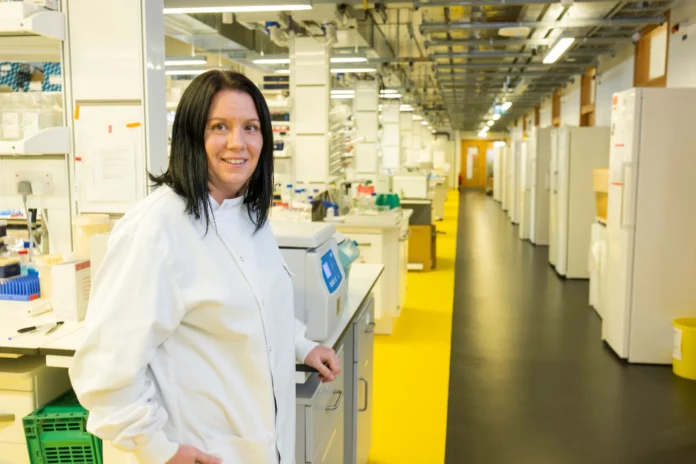Science
Researchers Uncover New Pathway for Bowel Cancer Immunotherapy

Researchers at the University of Galway have made significant strides in the battle against bowel cancer by uncovering a groundbreaking approach to immunotherapy. Their study, published in the Journal for ImmunoTherapy of Cancer (JITC), reveals how bowel cancer manipulates the immune system and how this process can potentially be reversed to enhance treatment outcomes.
Bowel cancer, also known as colorectal cancer, ranks as one of the most prevalent cancers worldwide and is the second leading cause of cancer-related deaths. Alarmingly, diagnoses among individuals under 50 have surged, nearly doubling since 1990. In Ireland alone, the disease affects over 2,500 people annually.
Reprogramming the Immune Response
The research team demonstrated that structural stromal cells within tumors actively disable the immune system. This discovery is pivotal as it marks the first time research has shown that these stromal cells can reprogram the body’s immune response, specifically targeting vital immune cells known as natural killers (NK) and macrophages. According to Professor Aideen Ryan, a leading figure in the study, “While immunotherapy has revolutionized treatment for cancers such as melanoma and lung cancer, it has offered limited benefits for bowel cancer, leaving patients with scant options and poor prognosis.”
The study identifies a critical interaction between cancer cells and immune cells, revealing how tumor stromal cells create an “immune brake.” This mechanism prevents the immune system from effectively combating the cancer. The stromal cells, which support tumor growth, are coated in sugars called sialoglycans that interact with immune cell receptors known as Siglecs. This interaction effectively switches off the immune response, rendering immunotherapy ineffective.
New Therapeutic Opportunities
Researchers found that by inhibiting the enzyme responsible for producing these Siglec-binding sugars using drugs called sialidases, they could reactivate NK cells and macrophages. This reactivation led to a reduction in tumor size and prevented cancer metastasis. The multidisciplinary effort involved collaboration with colorectal surgeons and pathologists at Galway University Hospital, led by Professor Aisling Hogan and Professor Sean Hynes, as well as experts from Queen’s University Belfast and Palleon Pharmaceuticals.
Professor Ryan emphasized the study’s implications, stating, “This world-first finding shows that some bowel cancer cells are not merely passive; they actively reprogram the body’s immune cells, thwarting their ability to fight back. We have uncovered a new checkpoint, and by focusing on it, we can enhance the immune system’s ability to combat the disease.”
As the research progresses, it brings renewed hope for patients with colorectal cancer and other malignancies resistant to existing immunotherapies. Michael O’Dwyer, Professor of Medicine and Scientific Director of the University of Galway Cancer Centre, noted, “The work of Professor Ryan and her research team highlights an important interplay between cells within a tumor that facilitates disease progression and metastasis.”
Jim Broderick, Chief Executive Officer and Founder of Palleon Pharmaceuticals, remarked on the significance of the findings, stating, “Targeting sialoglycan biology presents great potential for developing new therapies for diseases characterized by immune dysfunction, including cancer and autoimmunity.”
Professor Ryan’s innovative cancer research is currently featured in the Breakthrough Cancer Research exhibition titled “Cancer Revolution: Science, Innovation and Hope,” at Stephen’s Green Shopping Centre. The exhibition showcases striking microscopy images of stromal cells interacting with tumors, along with a 3D tumor model that visualizes how these cells inhibit the immune response in bowel cancer. The display underscores the potential for targeting this immune brake, offering new avenues for effective immunotherapy for colorectal cancer patients.
-

 Top Stories1 month ago
Top Stories1 month agoTributes Surge for 9-Year-Old Leon Briody After Cancer Battle
-

 Entertainment3 months ago
Entertainment3 months agoAimee Osbourne Joins Family for Emotional Tribute to Ozzy
-

 Politics3 months ago
Politics3 months agoDanny Healy-Rae Considers Complaint After Altercation with Garda
-

 Top Stories2 months ago
Top Stories2 months agoIreland Enjoys Summer Heat as Hurricane Erin Approaches Atlantic
-

 World3 months ago
World3 months agoHawaii Commemorates 80 Years Since Hiroshima Bombing with Ceremony
-

 Top Stories3 months ago
Top Stories3 months agoFianna Fáil TDs Urgently Consider Maire Geoghegan-Quinn for Presidency
-

 Top Stories1 month ago
Top Stories1 month agoNewcastle West Woman Patricia Foley Found Safe After Urgent Search
-

 World3 months ago
World3 months agoGaza Aid Distribution Tragedy: 20 Killed Amid Ongoing Violence
-

 World3 months ago
World3 months agoCouple Convicted of Murdering Two-Year-Old Grandson in Wales
-

 Top Stories3 months ago
Top Stories3 months agoHike Donegal’s Errigal Mountain NOW for Unforgettable Summer Views
-

 Top Stories3 months ago
Top Stories3 months agoClimbing Errigal: A Must-Do Summer Adventure in Donegal
-

 World3 months ago
World3 months agoAristocrat Constance Marten and Partner Convicted of Infant Murder









